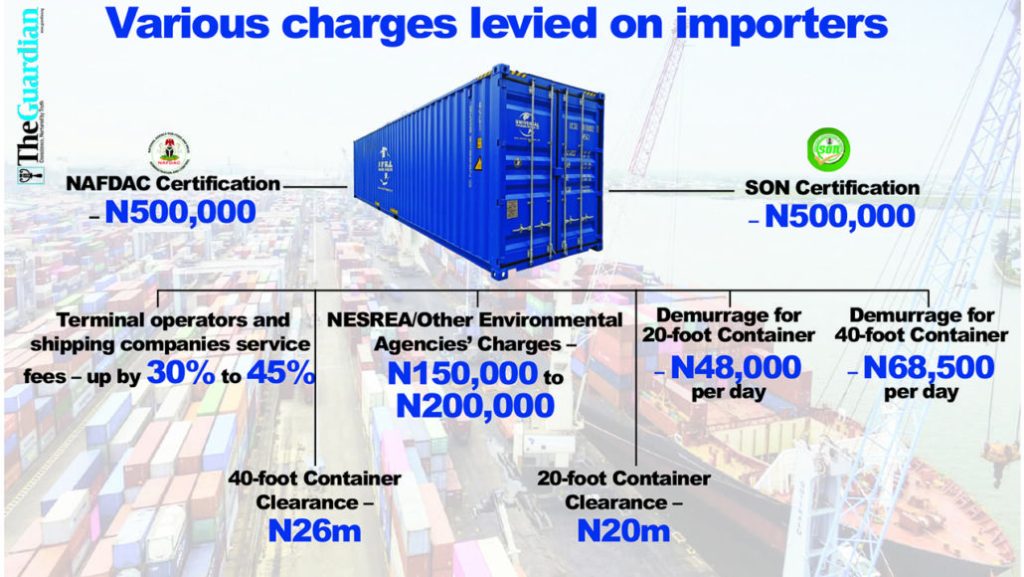
- Port costs in Nigeria 40% higher than regional competitors
- Clearing fees for a 20-foot container have nearly doubled since January
- Operators decry high charges, inefficiencies strangling importation
A growing number of importers are diverting their cargo to neighboring West African countries—particularly Togo, Ghana, and Benin—to bypass the rising tariffs and multiple charges imposed at Nigerian ports.
The escalating costs, driven by multiple government agencies, terminal operators, and shipping companies, have nearly doubled in under a month, pushing cargo clearance beyond the reach of many businesses.
Lagos ports are experiencing a significant decline in traffic, contradicting Nigeria’s ease of doing business campaign. The Nigerian Ports Authority (NPA) recently raised port rates, dues, and tariffs from 7% to 15%, marking a sharp increase of over 100%.
In addition, the Nigeria Customs Service (NCS) had proposed a 4% levy on the Free-on-Board (FOB) value of imported goods—though implementation is currently suspended—on top of the existing 1% Comprehensive Import Supervision Scheme (CISS) fee.
Terminal operators and shipping firms have also raised their fees, with increases ranging from 15% to 45%, depending on the service provider. Additional regulatory charges are under review, including:
- N500,000 for the Standards Organisation of Nigeria (SON) and the National Agency for Food and Drug Administration and Control (NAFDAC) certifications.
- N150,000 – N200,000 for the National Environmental Standards and Regulations Enforcement Agency (NESREA).
- Unofficial payments (such as tips for expedited clearance) ranging from N10,000 to N20,000 per spot.
With the newly introduced 4% levy, industries importing raw materials—where duties are typically 5%—now pay an additional 80% of the duty amount in administrative fees imposed by customs.
The total cost of clearing a 40-foot container has surged from N18 million – N20 million to N26 million since the end of January. Similarly, the cost for a 20-foot container has nearly doubled from N10.5 million to N20 million.
Once the dominant hub for 70% of West African-bound cargo, Nigerian ports are now losing their competitive edge. The Managing Director of the NPA, Dr. Abubakar Dantsoho, acknowledged that Nigeria currently handles fewer than two million Twenty-foot Equivalent Units (TEUs), even though 70% of cargo destined for the region is meant for Nigeria. A large portion is now routed through Togo, Benin, and Ghana.
The Shippers Association of Lagos (SAL) confirmed that many of its members now transport their containers through these alternative ports before bringing them into Nigeria via land.
Nigeria’s economy is already under strain from inflation, foreign exchange volatility, and declining industrial output. At the ports, businesses must contend with:
- Multiple levies from customs, terminal operators, and shipping firms
- Frequent clearance delays leading to costly demurrage fees
- A lack of infrastructure improvements despite rising costs
Minister of Marine and Blue Economy, Adegboyega Oyetola, recently admitted that doing business at Nigerian ports costs 40% more than in neighboring West African countries, making them more attractive to traders.
Clinton Ikechukwu Okoro, CEO of Globe Joy Investment Nigeria Limited, warned that importers are struggling to cope. “The benchmark for import charges has jumped from N14 million to N17 million – N18 million, and when all levies are factored in, clearing a 40-foot container now costs N26 million, while a 20-foot container costs N20 million,” he said.
Okoro, who is also the Public Relations Officer of the Africa Association of Professional Freight Forwarders and Logistics of Nigeria (APFFLON), Tin Can Chapter, noted that importers are left with no choice but to shift the financial burden to consumers.
Beyond the cost, clearance delays and demurrage fees are adding to the frustration. Even when all certifications are secured, importers face clearance hold-ups of two to seven days, accruing additional charges.
- Demurrage fees: N68,500 per day for a 40-foot container, N48,000 for a 20-foot container
- Storage fees: Previously N6,000 – N12,000 per day, now nearly on par with demurrage rates
A former president of SAL, Jonathan Nicol, revealed that 60% of cargo meant for Nigeria is now being diverted to ports in Togo, Benin, and Ghana due to excessive costs and bureaucratic bottlenecks.
He cited shipping association data showing that Nigerian importers pay more in non-customs-related fees than their counterparts in the region, making trade increasingly unsustainable.
“We need the government to reduce the cost of doing business. Shippers are already burdened by levies from shipping companies, terminal operators, and clearing agents. Any further increase will worsen the situation,” Nicol warned.
A recent import duty breakdown further illustrates the escalating costs:
- Import duty: N11.2 million
- ECOWAS Trade Liberalisation Scheme (ETLS) fee: N280,449
- Financing NCS Operations (FCS) charge: N1,857,756
- Comprehensive Import Supervision Scheme (CISS) fee: N464,440
- Surcharge: N785,253
Funmilayo Uche, a maritime sector expert, also raised concerns about rising transport costs. “In December, moving a 40-foot container cost N400,000 – N500,000. Today, the price has skyrocketed to N850,000 – N1 million. How can businesses survive?” she asked.
Uche criticized the Nigerian Ports Authority (NPA) for justifying price hikes on the grounds that fees had remained unchanged for 32 years, questioning where the promised infrastructure improvements were.
“Even basic operations like obtaining loading papers are chaotic. Truckers blame the NPA, the NPA blames terminal operators, and terminal operators claim they’re not responsible. It’s a mess,” she said.
Segun Ajayi-Kadir, Director General of the Manufacturers Association of Nigeria (MAN), cited a United Nations Conference on Trade and Development (UNCTAD) report, which found that 80% of Nigeria’s trade is transported by sea, with 70% of West and Central African imports and exports destined for Nigeria.
He warned that excessive port charges will lead to:
- Higher production costs
- Increased inflation
- Reduced competitiveness of locally manufactured goods
“Failure to address these issues will push more businesses away, leading to revenue losses, job cuts, and worsening economic hardship,” Ajayi-Kadir cautioned.
Industry leaders insist that simply raising fees without improving service quality is unsustainable. Instead, they are calling for:
- A review and reduction of port charges to remain competitive
- Faster clearance processes to reduce demurrage and storage fees
- Better infrastructure investments to justify rising tariffs
- More efficient regulation to cut out unnecessary bureaucratic hurdles
As major importers increasingly favor alternative ports in West Africa, Nigeria risks losing its position as the region’s leading trade hub unless urgent reforms are implemented.






